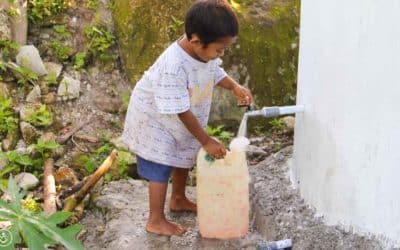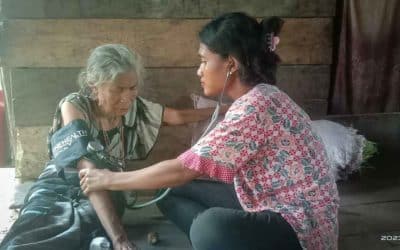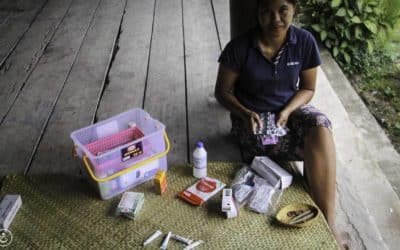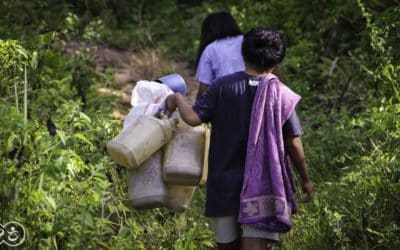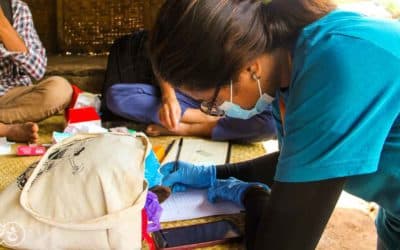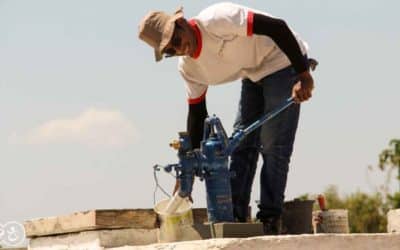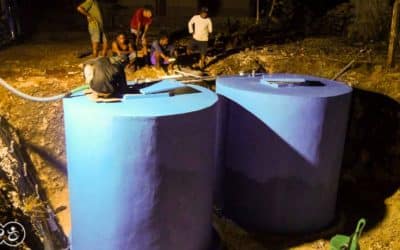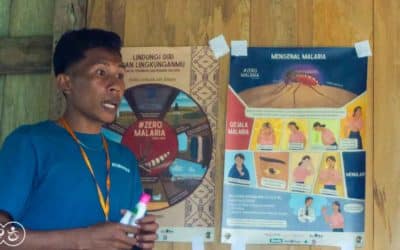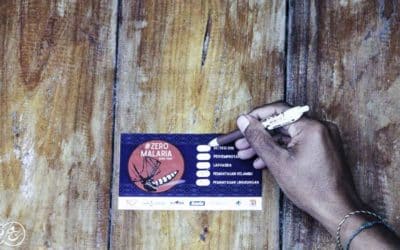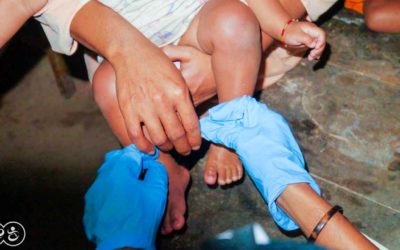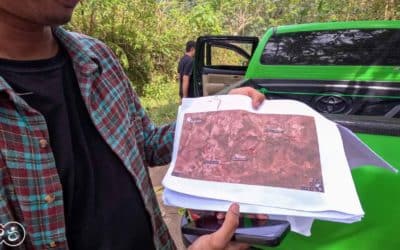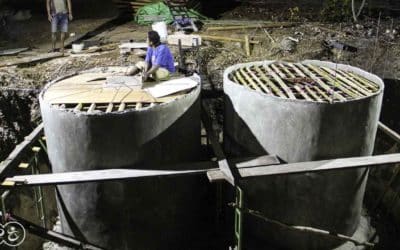In East Sumba, a 60-meter deep drilling project stands as a beacon of transformation. This gargantuan endeavor by Fair Future and Kawan Baik is not just about providing clean water; it’s a comprehensive approach to improve public health, education, and quality of life for over 2,000 people. This is where the battle against diseases like malaria takes a new turn, a testament to human resilience.
Through the Primary Medical Care program, Kawan Sehat health workers provide treatment for fevers, wounds, and malaria in villages lacking access to doctors. They carry essential medicines, adhere to established medical protocols, and refer emergency cases promptly to prevent delays in care.
Donate
Support Care
Programs
All projects
Quick News
Field updates
Stories
Field stories
The province of Nusa Tenggara Timur, home to some of Indonesia’s most remote and underserved communities.
Eastern Indonesia’s Teachers Become First Responders in Critical Rural Healthcare
In ultra-rural eastern Indonesia, the idea of prompt medical care is often a distant dream. Enter Fair Future’s Kawan Sehat agents—a team of over 60 women transforming this grim reality. Equipped with first-aid essentials and life-saving drugs, they’re not just healthcare providers; they’re community saviors
Transforming Rural Healthcare Through Local Teachers
In Eastern Indonesia’s most isolated regions, the closest hospital might as well be on another planet. Who then comes to the rescue? Not medics from distant cities, but local teachers. Trained by Fair Future, these teachers transform into frontline health agents, acting as the first line of defense against life-threatening diseases like malaria, tuberculosis, and polio. This isn’t the future; this is now. Join us in this radical shift in community healthcare.
Breaking Water Barriers for Women and Girls in East Sumba
In this news "Picture of the Day", under the terrible heat of East Sumba, a mother and her daughter trudge forward, carrying five empty jerry cans. Their feet tread on arid ground, strewn with stones and brush. The day started a few hours ago and the journey is far from over. They have travelled more than five kilometres on foot and have as much ahead of them to reach their destination: Kullups, holes dug by hand in the rock of a hill. (Ref. Read this article here)
In this part of the world, kullups are more than mere rainwater reservoirs; they represent a vestige of human ingenuity against near-chronic water scarcity. Rainwater, channeled by soil and rock, seeps in to feed these small stone basins at the foot of a hill. It's a source of life, but also a source of heart-wrenching dilemmas. For every precious drop, there is a hidden cost, measured not in money but in lost opportunities, compromised health, and uncertain futures.
Consider the mother. Each trip for water represents hours when she can't work, maintain her home, or care for her family. What about her daughter? With every step she takes toward the kullup, she moves further from an education that could unlock doors to a better future. The thirst for learning is there, but it is weighed against a more immediate, more vital thirst.
Against this backdrop, the teams from Fair Future and Kawan Baik step in, armed with the will to make a difference and the tools and expertise needed to do so. The #WaterConnections program doesn't merely supply water; it aims to redefine these communities' relationship with this essential resource. By installing water collection and filtration systems, educating on hygiene best practices, and encouraging community participation, Fair Future and Kawan Baik aim to break the vicious cycle of poverty and disease.
Waterborne diseases like Malaria, Dengue, diarrhea and cholera are commonplace in these areas. But their impact doesn't stop at the individual. A sick mother cannot provide for her family. A sick daughter cannot attend school. And a cycle of suffering and poverty perpetuates, generation after generation.
The work of Fair Future and Kawan Baik isn't completed in a day or even a year. It's a long-term commitment, an investment in the future of these communities. But every installed water system, every educational session, and every assisted family represents a step toward a future where this mother and daughter won't have to choose between the present and the future, between thirst and the thirst for learning.
In a world where clean water is often taken for granted, it's easy to forget that for some, it's a luxury that comes at a high price. By working on the ground alongside those who live this reality every day, Fair Future and Kawan Baik remind us that behind every drop of water, there's a human story, a struggle, and an opportunity for change.
Alex Wettstein – Fair Future Foundation medico-social camp in East Sumba – Rumah Kambera, Lambanapu, 17th of October, 2023.
ZeroMalaria Report: The Ongoing Fight for Malaria Control in East Sumba
Fair Future’s ZeroMalaria Report illuminates the organization’s impactful but ongoing battle against Malaria in East Sumba. The multi-faceted approach includes clean water infrastructure, community education, and empowerment. Learn how these efforts are making a tangible difference but also underscore the long journey ahead
Dragon Pumps: Fair Future’s #WaterConnections in Laindatang
The arrival of Dragon pumps in Laindatang, East Sumba, marks a watershed moment in Fair Future’s #WaterConnections project. In collaboration with Kawan Baik and Rotary Australia, we are transforming the health landscape of this isolated village. From reducing the prevalence of infectious diseases to providing the first-ever sanitary installations, discover how clean water is rewriting the community’s story.
Bringing Clean Water to Tanambanas #WaterConnections
Fair Future’s #WaterConnections project is a beacon of hope in Tanambanas, Sumba, where every drop of water is a treasure. By collecting and filtering rainwater, we’re creating not just reservoirs but sanctuaries of health. Dive into this inspiring story of how innovation and collective effort are changing lives, one drop at a time.
Breaking Malaria’s Grip: Transformative Healthcare Solutions for Eastern Indonesia
In ultra-rural regions of Eastern Indonesia, malaria is more than a disease; it’s a systemic issue impeding community development. Fair Future Foundation’s #ZeroMalaria program tackles this crisis head-on with a unique, comprehensive approach. From preventive education to providing immediate healthcare, we are dedicated to breaking the chain of malaria. Our council members are actively involved on the ground, ensuring effective, sustainable solutions tailored to community needs.
Zero Malaria: The Stickers That Save Lives in East Sumba
This New “Picture of the Day” highlights much more than a simple sticker; it reveals a crucial component of our ongoing fight against malaria. Within Fair Future’s #ZeroMalaria program, our social and medical teams dedicate their expertise and energy to affixing these stickers to the walls of homes in the villages and regions of East Sumba where we work. These stickers are not just markers but vital indicators in our overall approach to protecting and educating the most vulnerable communities.
In the remote villages of East Sumba, Indonesia, a simple sticker can mean the difference between life and death. As part of Fair Future’s Zero Malaria program, these stickers are affixed to the walls of homes, serving as a visual indicator of our comprehensive approach to malaria control.
In the battle against malaria, we don't overlook any details. From microscopic examinations to stickers on walls, every action is a step towards a malaria-free future. These stickers are not just adhesives; they are badges of education, prevention, and hope.
Family Member Detection: Early diagnosis is crucial in regions like East Sumba, where malaria is rampant. Our teams employ optical microscopic examinations to visualize plasmodia in patients' thick or thin blood smears. We also utilize Rapid Diagnostic Tests for Malaria (TDR).
Indoor Residual Spraying (PID): We conduct Indoor Residual Spraying (PID) in every home across the villages. This involves the regular application of long-lasting chemical insecticides on the inner walls of houses. The insecticide remains effective for several months, killing mosquitoes that come into contact with it.
Larvicides: Regular application of microbial or chemical insecticides to water bodies or reservoirs is another crucial aspect. The goal is to reduce the adult mosquito population by killing the immature aquatic forms, thereby limiting their development into adults.
Bed Nets: The distribution of insecticide-treated bed nets (MII) is essential in our fight against malaria. These nets have proven highly effective in reducing malaria-related deaths and illnesses.
Environmental Surveillance: We also pay close attention to the living conditions in these areas. Factors like inadequate sanitation facilities, unsanitary conditions, stagnant water, and areas where animals like pigs and water buffaloes are kept can significantly contribute to mosquito proliferation.
This is why the sticker takes on such importance. It informs villagers whether a particular home has been treated, whether its inhabitants have undergone screening and whether they have been educated on protecting themselves from the disease.
Thank you very much for your support.
Alex Wettstein – Fair Future Foundation medico-social camp in East Sumba – Rumah Kambera, Lambanapu, 5th of October, 2023.
The #ZeroMalaria Mission: Testing East Sumba’s Population in Extreme Conditions
Embark on a journey with the Fair Future Foundation’s groundbreaking #ZeroMalaria program, aimed at eradicating malaria in East Sumba, Indonesia. This ambitious initiative seeks to test at least 87% of the local population, even in the most remote and challenging terrains. Discover how our specialized socio-medical teams navigate logistical hurdles, from electricity shortages to extreme weather conditions, to conduct tens of thousands of tests.
Behind the Scenes: Fair Future’s Anti-Malaria Effort in East Sumba
Fair Future Foundation, in collaboration with Kawan Baik and Sumba Volunteer, is taking bold steps to eradicate malaria in one of the world’s most affected regions—East Sumba, Indonesia. This comprehensive program aims to serve tens of thousands of people, focusing on early diagnosis and effective treatment. With more than 10 tons of medical equipment and a dedicated team, we are committed to this cause as a moral obligation. Read on to discover the intricate details of this life-changing initiative.
Revolutionizing Water Access in Tanambanas: Sustainable Ferrocement Solution
Fair Future, in partnership with Kawan Baik, is taking revolutionary strides to resolve the critical water shortage in Tanambanas. This groundbreaking initiative employs innovative ferrocement technology to build durable, cost-effective water reservoirs. More than just a construction project, this initiative is a lifeline for an ultra-rural community, catalyzing improved health, poverty reduction, and ensuring the fundamental human right to clean water.



